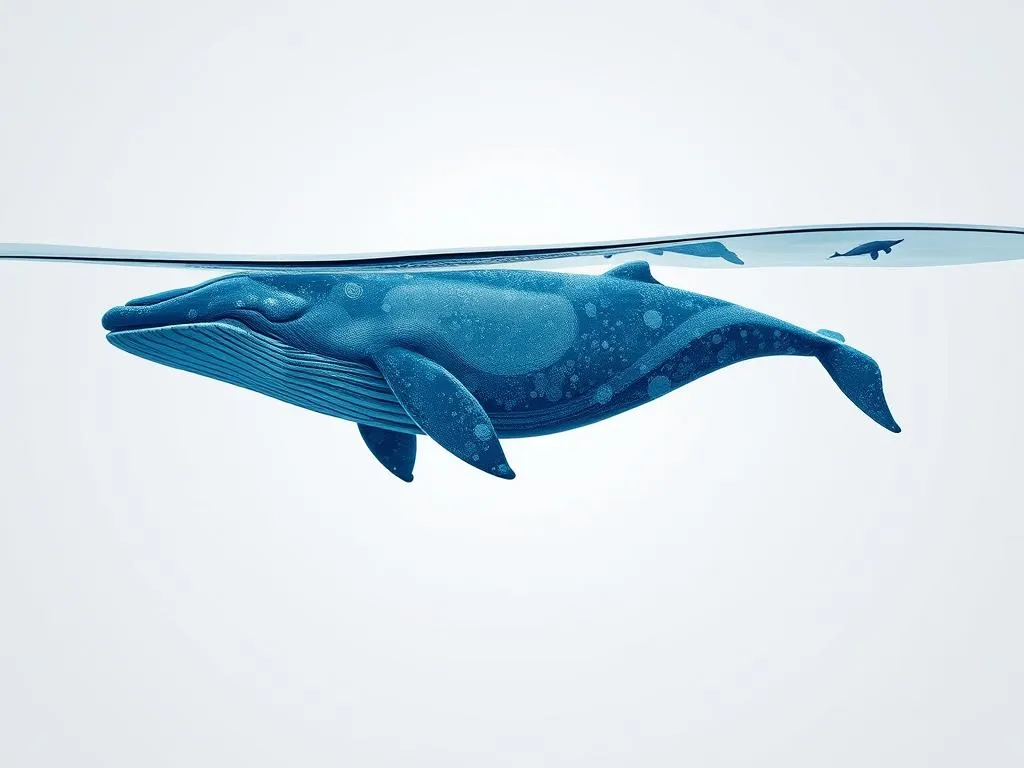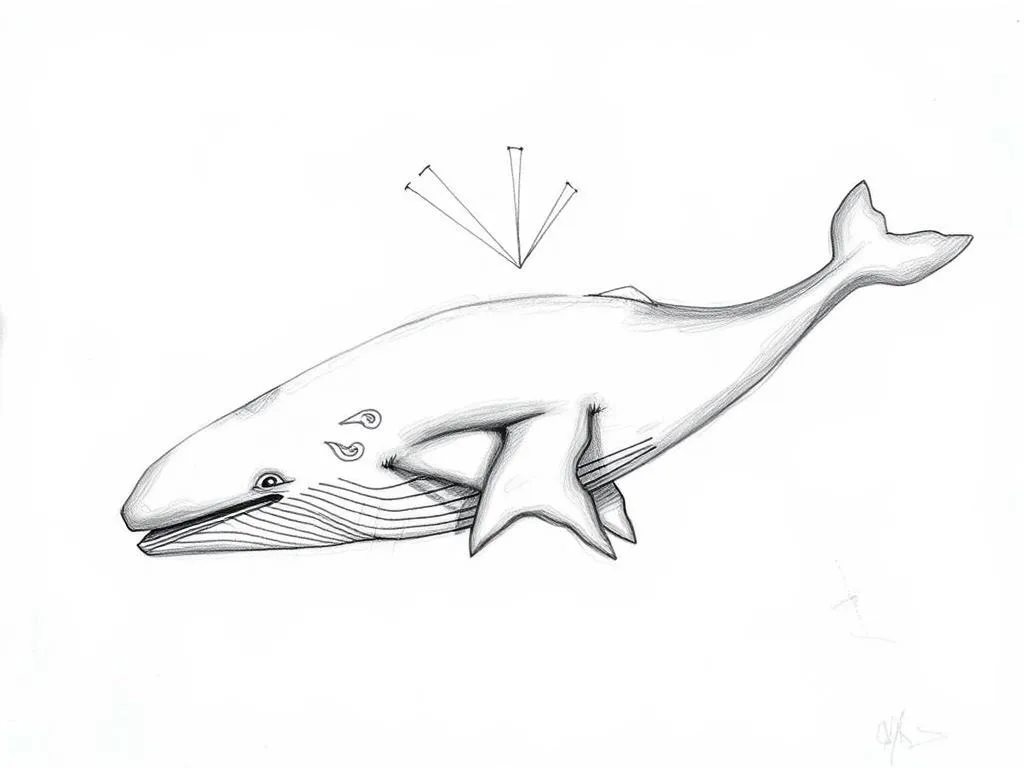The Deep Wisdom of Whales: Symbolism and Spiritual Meaning

Disclaimer: Some images on this website are AI-generated artworks and may not accurately represent real animals.
Whales, the majestic giants of the ocean, embody profound symbolism and spiritual meaning that resonate deeply within various cultures and personal experiences. Their presence in our lives is not merely biological but also spiritual, reflecting the mysteries of existence and the depths of our emotions. This blog post explores the intricate world of whales, their biological overview, cultural significance, and the rich tapestry of whale symbolism that permeates our dreams and modern interpretations.
Understanding Whales
Biological Overview
Whales are fascinating creatures belonging to the order Cetacea, which includes both whales and dolphins. They are further classified into two main groups: baleen whales (Mysticeti) and toothed whales (Odontoceti). The diversity among whale species is remarkable, with sizes ranging from the tiny dwarf sperm whale, measuring about 8.5 feet, to the colossal blue whale, which can reach lengths of up to 100 feet.
| Characteristic | Baleen Whales | Toothed Whales |
|---|---|---|
| Size | Up to 100 feet | Up to 60 feet |
| Feeding Mechanism | Filter feeders | Predators (fish, squid) |
| Social Behavior | Often solitary or in pairs | Complex social structures |
| Intelligence | High; exhibit social learning | Extremely high; use echolocation and complex communication |
Whales are renowned for their intelligence, intricate social structures, and emotional depth. They exhibit behaviors such as cooperation, play, and even mourning, showcasing the emotional complexity often attributed to these magnificent creatures.
Cultural Significance
Throughout history, whales have been revered in various cultures for their size, grace, and mysterious nature. Indigenous peoples of the Pacific Northwest view the whale as a powerful symbol of strength and wisdom, often featuring them in totem poles and storytelling. In many cultures, whales have been seen as guardians of the sea, representing the spiritual connection between humans and the ocean.
Myths and legends surrounding whales often highlight their role as guides or protectors. In some traditions, the whale is viewed as a bridge between the physical and spiritual realms, embodying the power of transformation and the journey of the soul.

Symbolism & Spiritual Meaning
Connection to the Ocean
Whales symbolize the depths of the ocean, which can be seen as a metaphor for our emotional landscapes. The vastness of the sea reflects the complexities of human emotions, ranging from joy to sorrow. The whale, as a creature of such depth, invites us to explore our feelings and acknowledge the unconscious mind’s hidden aspects.
In many spiritual practices, the ocean is associated with the subconscious—where our deepest fears, hopes, and dreams reside. The whale serves as a powerful reminder to dive deep into our emotional waters and confront the truths that lay beneath the surface.
Wisdom and Intellect
Known as symbols of knowledge and insight, whales teach us about communication and relationships. Their sophisticated vocalizations and social interactions exemplify the importance of connection in our lives. Just as whales communicate across vast oceanic distances, we, too, can learn to express ourselves more openly and authentically.
The wisdom of whales encourages us to seek knowledge not just academically but through life experiences and emotional understanding. They remind us that true wisdom is often rooted in our ability to connect with others and the world around us.
Journey and Migration
Whales are also emblematic of travel and the journeys we undertake throughout our lives. Their incredible migration patterns, some spanning thousands of miles, represent the transitions we experience—from personal growth to life changes. The symbolism of migration emphasizes the significance of each phase in our life’s journey, whether it be exploration, growth, or returning home.
Understanding the whale’s migration encourages us to embrace our own life journeys, recognizing that each experience contributes to our personal development and understanding of the world.
Whales in Dreams
Interpreting Whale Dreams
Whales often appear in dreams, carrying rich symbolism and meaning. These dreams may represent various aspects of our lives, including our emotional state, personal growth, and spiritual journey. Here are some common themes associated with whale dreams:
| Dream Theme | Interpretation |
|---|---|
| Whale Breaching | A breakthrough in emotional or spiritual matters |
| Swimming with Whales | Connection to subconscious emotions |
| Stranded Whale | Feeling lost or out of place in life |
| Whale Song | A call to express oneself or connect with others |
When interpreting dreams featuring whales, consider the context and your personal feelings during the dream. The whale may serve as a messenger, urging you to dive deeper into your emotions or prompting you to reflect on specific life situations.
Emotional Reflection
Whales in dreams often serve as powerful messengers of emotional depth and healing. They can symbolize the need to address unresolved feelings or highlight the importance of emotional expression. By engaging with whale symbolism in dreams, individuals can gain insights into their emotional health and personal growth.
Understanding the context of these dreams is crucial. For instance, a dream about swimming with whales may indicate a desire for connection, while witnessing a stranded whale might reflect feelings of isolation or distress. Engaging with these symbols can provide a pathway to emotional healing and understanding.
Modern Interpretations
Whales in Popular Culture
Whales have made significant appearances in literature, film, and art, often symbolizing freedom, mystery, and the unknown. From Herman Melville’s “Moby Dick” to Disney’s “Free Willy,” whales have captured the human imagination, serving as profound symbols of the human experience.
The conservation efforts surrounding whales have also influenced modern interpretations of their symbolism. As we become more aware of the threats facing these majestic creatures, the symbolism of whales extends into the realm of environmental stewardship. Whales represent the fragility of marine ecosystems, reminding us of the interconnectedness of all life.
Whales as Environmental Symbols
In contemporary society, whales have become significant symbols of ocean health and awareness. Their plight has galvanized conservation movements, highlighting the need to protect marine habitats and the delicate balance of ocean ecosystems. As charismatic megafauna, whales embody the urgency of environmental advocacy and the importance of preserving our planet’s natural wonders.
The spiritual connection to marine life is increasingly recognized, with whales serving as a reminder of our responsibility to care for the ocean. By understanding the symbolism of whales, we can cultivate a deeper appreciation for the environment and the life it sustains.
Key Takeaways
The multifaceted symbolism of whales encompasses a wide range of spiritual and emotional meanings. Here are some key reflections to consider:
- Emotional Depth: Whales symbolize the exploration of our emotional landscapes and the importance of acknowledging our feelings.
- Wisdom and Communication: They serve as reminders of the significance of connection and open communication in our relationships.
- Life’s Journey: The migration of whales symbolizes the transitions and journeys we undertake in our lives.
- Healing and Reflection: Whales in dreams can offer insight into our emotional health and personal growth.
- Environmental Guardians: They represent our responsibility to protect marine ecosystems and promote ocean health.
Conclusion
Embracing the wisdom of whales can guide us on our journeys through life. By understanding their symbolism and spiritual meaning, we can cultivate greater emotional awareness, foster deeper connections with others, and recognize the importance of our relationship with the natural world.
As we reflect on the significance of whales, let us remember our role in the larger ecological narrative. Protecting whale populations and their habitats is not just an environmental concern; it is a spiritual responsibility that connects us all. By engaging with the symbolism of whales, we can foster a deeper appreciation for marine life and the vital role it plays in our existence.







